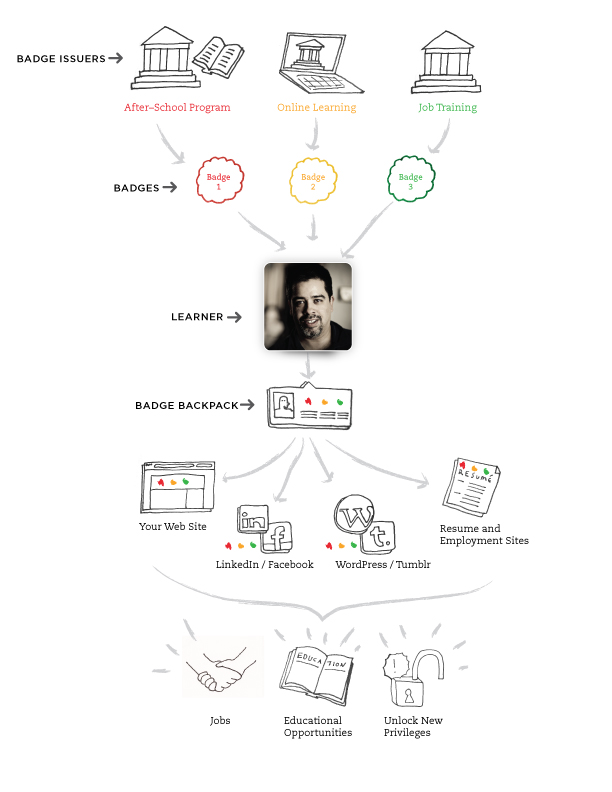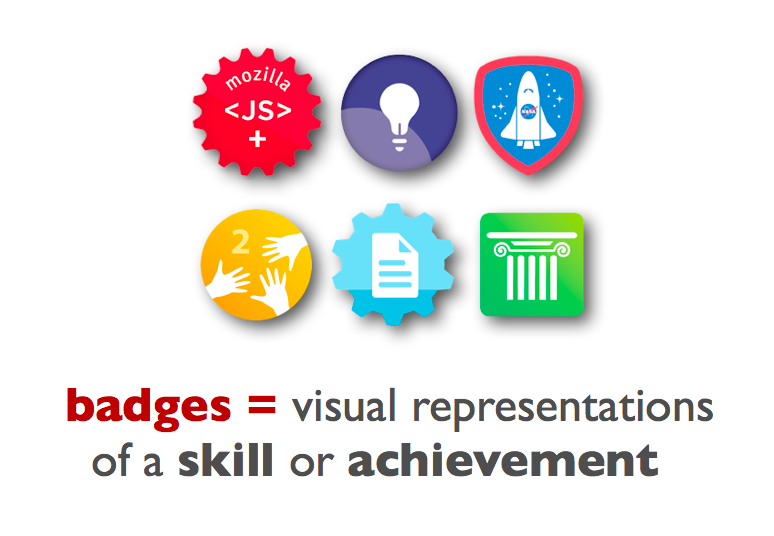Organizing What You Have Learned and Achieved - Mozilla Open Badges
Mon, 2012-09-03 15:10 — jthuang

Mozilla Open Badge is a project that combines online identity (Mozilla Persona, formerly BrowserID), online learning, and gamification. Including partners like the MacArthur Foundation, and collaborators like NASA, Intel, and Disney-Pixar, the project provides the platform and infrastructure for the badge issuers, badge earners and badge finders to build up an organizing system that enriches the online learning experiences and encourages life-long learning. In this organizing system,

Mozilla Open Badge is a project that combines online identity (Mozilla Persona, formerly BrowserID), online learning, and gamification. Including partners like the MacArthur Foundation, and collaborators like NASA, Intel, and Disney-Pixar, the project provides the platform and infrastructure for the badge issuers, badge earners and badge finders to build up an organizing system that enriches the online learning experiences and encourages life-long learning. In this organizing system,
- Badge Issuers can decide which learning experiences are significant enough to be issued a badge as a reward, how the experiences are related to one another, and how the experiences to be validated, and therefore build up their own learning communities.
- Badge Earners can decide which learning experiences they are aiming for, organize their online learning experiences, display what they have learned and achieved in the online learning processes, and therefore utilize these experiences as resources to help others or to get better job offers.
- Badge Finders can find their urgent need of specific talented and trained persons, the invaluable resources.
Online Identity
With the explosive growth of web services and mobile apps, we users nowadays may have lots of signup and login forms to fill out. Why can't we just have one online identity and login all the web services and mobile apps with it? Therefore, there are standards like OpenID and OAuth that make us able to login and share resources to various services and apps only with our Facebook or Google account. Nevertheless, the login functionality is not the online identity all about. The online identity can also be used as a centralized identity that connect all the services we used and piece together the experiences and memories we left in various services.
Online Learning
Now we are accustomed to sharing our life experiences with our friends on Facebook, receiving emails and store all kinds of documents on Google, and recording our professional experiences on LinkedIn. All these are the memories and experiences that online identity may help us glue together. Recently, another kind of experience that may appear more and more often in our and next generation's online interactions: online learning experiences. Sites like Khan Academy, TED-Ed, Codeacademy, Course Hero, and Udemy, and university-based Coursera, Udacity, and edX (and aggregated site Class Central) have opened up an new era of online learning.
Gamification
Moreover, in this new wave of online teaching and learning, gamification also plays an important role. It applies to applications in order to encourage people to adopt them, or to influence how they interact with users, making the applications more engaging by taking advantage of humans' psychological predisposition to engage in gaming. The new online learning sites are not only about lectures, but also with well-designed gamified interactions to motivate the learners to learn better and achieve more. One of the important factors in gamification is the "Achievement Badge." If students have learned something or solved some difficult problems, they can earn the badges to prove their accomplishments, and they may even be recognized as another higher level after gaining some combinations of badges. Students can also see what other badges their peers earned, and may therefore have the motivation to achieve those, or know whom to ask for help. This mechanism makes learning a lot of fun. Just look at how many people are so enthusiastic about collecting badges on Foursquare! It seems that we humans just can not resist games and badges! 

The project has shipped beta release this April. If you are interested in online identity, online learning, or gamification, you may want to check out this project.
Related News:
Mozilla Open Badges ships Beta release 04/10/2012
Rethinking the Learning Experience 08/09/2012
Related Slides:
Image Credit:
- jthuang's blog
- Login to post comments